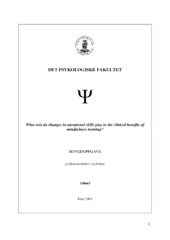What role do changes in attentional skills play in the clinical benefits of mindfulness training?
Master thesis
Permanent lenke
https://hdl.handle.net/1956/3834Utgivelsesdato
2010-02-12Metadata
Vis full innførselSamlinger
- Faculty of Psychology [523]
Sammendrag
The practice of mindfulness meditation has increasingly been found to have effects on mental processes relevant to many psychological problems and disorders. The harnessing of attentional skills has a central role in historical accounts of this practice and has been proposed to be one of the central mechanisms through which the clinical benefits of this training occurs. I present an overview of studies that have investigated how this training affects our attentional skills. These have reported both behavioral improvements and alterations in brain structures involved in attention. When addressing the question of how improvements in attentional skills are involved in the observed clinical benefits of mindfulness training, the interplay of these skills with other core determinants for psychological health is also relevant. A central goal and feature of most modern psychotherapeutic approaches is the enhancing of emotional self-regulatory processes, and mindfulness seems to affect such capacities positively. However, the investigation of mindfulness and its effects pose some psychometrical challenges and other possible processes and mechanisms through which the demonstrated clinical effects could occur will also be discussed. A recent approach in which the human brain is viewed as intrinsically organized into dynamic, anticorrelated functional networks will be discussed as an alternative framework for understanding the role of attention in exerting clinical benefits.
Utgiver
The University of BergenOpphavsrett
Copyright the author. All rights reservedThe author
